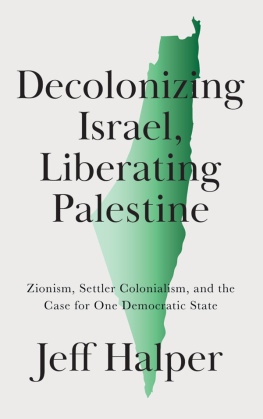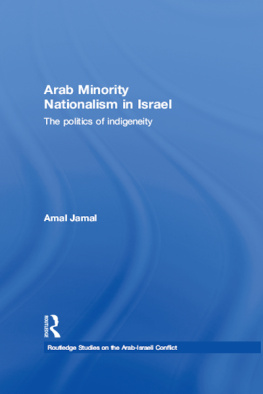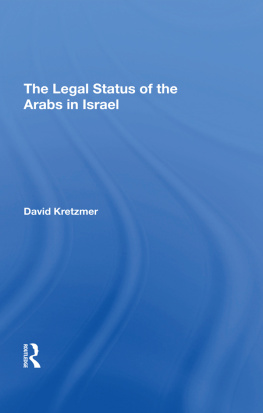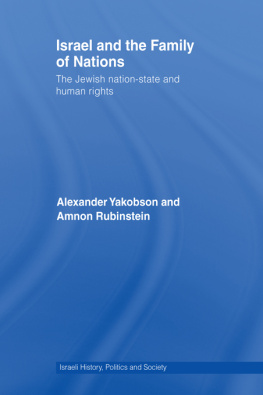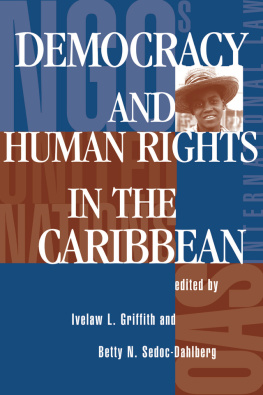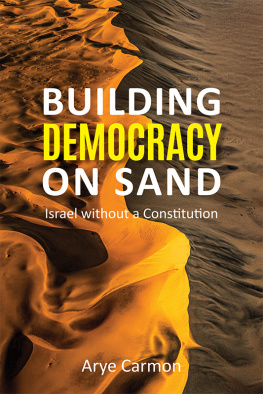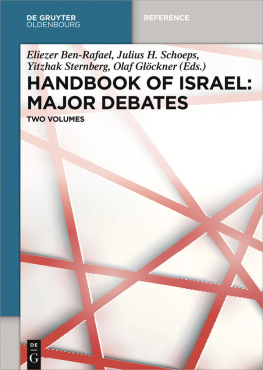First published 1993 by M.E. Sharpe
Published 2015 by Routledge
2 Park Square, Milton Park, Abingdon, Oxon OX14 4RN
711 Third Avenue, New York, NY 10017, USA
Routledge is an imprint of the Taylor & Francis Group, an informa business
Copyright 1993 by Daphna Sharfman. All rights reserved.
No part of this book may be reprinted or reproduced or utilised in any form or by any electronic, mechanical, or other means, now known or hereafter invented, including photocopying and recording, or in any information storage or retrieval system, without permission in writing from the publishers.
Notices
No responsibility is assumed by the publisher for any injury and/or damage to persons or property as a matter of products liability, negligence or otherwise, or from any use of operation of any methods, products, instructions or ideas contained in the material herein.
Practitioners and researchers must always rely on their own experience and knowledge in evaluating and using any information, methods, compounds, or experiments described herein. In using such information or methods they should be mindful of their own safety and the safety of others, including parties for whom they have a professional responsibility.
Product or corporate names may be trademarks or registered trademarks, and are used only for identification and explanation without intent to infringe.
Library of Congress Cataloging-in-Publication Data
Sharfman, Daphna.
Living without a constitution: civil rights in Israel /
Daphna Sharfman
p. cm.
Includes bibliographical references and index.
ISBN 1-56324-145-5
1. Civil rightsIsrael.
2. Human rightsIsrael.
3. IsraelConstitutional law.
I. Title.
JC599.I68S53 1993
323'.095694dc20
92-31397
CIP
ISBN 13: 9781563241451 (hbk)
The present study concerns the development of democracy in Israel. It examines the major political and ideological conflicts that occurred over issues pertaining to civil rights, equality, and social justice. From the very start, it seemed to me that the convenient popular myth that security problems were the reason for any Israeli failing in the area of civil rights was not all there was to tell. Thus, I embarked upon an investigation of the historical and social background of the present status of civil rights in Israel. In the process, I interviewed decision makers from various periods whose testimonies are, I believe, a unique contribution to the field.
The study examines the ideology of the founders of the Jewish settlement in Palestine at the turn of the century and the reasons behind the decision of David Ben Gurion and his followers to reject the idea of a written constitution and to preserve the state of emergency inherited from the British mandatea definition of the situation which remains to this very day. The influence of the religious parties and organizations in Israel and the position taken by the High Court of Justice on civil rights are examined in detail in view of their prominent role in the shaping of the question. Subjects like the Military Government, which ruled over Arab citizens of Israel until 1966, and the process of absorption of new immigrants in the 1950s are discussed not only because of their historical importance but also because they reveal the attitude of the Establishment and of the bureaucracy toward those who found themselves in a position of weakness, subject to their authority.
The analysis of these issues and others is designed to provide the reader with insight into Israeli democracy: the players who determine the rules of the political game, the strengths and weaknesses of the system, the major problems, and, finally, possible ways of improving it.
In the course of my work, I discovered the extent of the refusal of the political elite to relinquish its powers and its authority. It became clear that real changes cannot be made unless the major parties in the political system change their positions.
As a result of the conclusions I drew, I established a Civil Rights Committee in the Labor party, of which I am an active member. I was also responsible for the creation of a Human Rights Committee in the International Department of the Labor party, which is responsible for liaison with parties and organizations in other countries. In recent years these committees have conducted tours and debates and made decisions on human rights issues in Israel and the territories. The situation of human rights in the territories is, of course, a major problem. As much as I would like to think that this problem is only temporary, the fact is that the committees have hardly any direct effect on government policy.
Political activity of this type requires a long-term commitment. Nevertheless, I believe there is no other way to make political changes in the intermediate and long term, and no other way to bring the subject of civil rights to the forefront of the mainstream of Israeli politics.
When I was teaching Civil Rights at Haifa University, I emphasized the daily aspects of the problem: students were asked to investigate the relations between the public service and the ordinary citizen. It is my hope that when my students rise to influential positions, they will not only possess the requisite knowledge but will also keep an open mind with respect to the citizen and his or her rights.
The areas in which I have chosen to be active reflect my own view that along with the important activities of groups such as the Israel Association for Civil Rights and the various organizations that work for women's rights, the quality of the environment, and other matterswhich deal with contingenciesit is also important to work for long-term change in the prevailing norms and rules of the political game.
It goes without saying that Israeli society is also influenced by the international climate. There is of late an increased international awareness of human rights, even to the extent of its becoming "the new secular religion." Recent developments, especially in Eastern Europe, have put the importance of democracy into sharp relief. At the same time, serious problems have developed in connection with immigrants and refugees, who have not been accorded a warm reception by all citizens of the West. Israel has been directly affected by the latest developments, as the new openness brought a fresh wave of immigration from the lands of the former Soviet Union as well as new revelations of anti-Semitism and the suppression of minority groups.
I believe that the lessons to be learned from these developments are first of all humanitarian ones. The need for keen vigilance on behalf of human rights and minority groups never ends; new challenges are forever arising and forcing us to examine anew the society in which we live and to reaffirm our own commitment to civil rights.
Haifa, October 1992
Living Without a Constitution
Civil Rights in Israel



